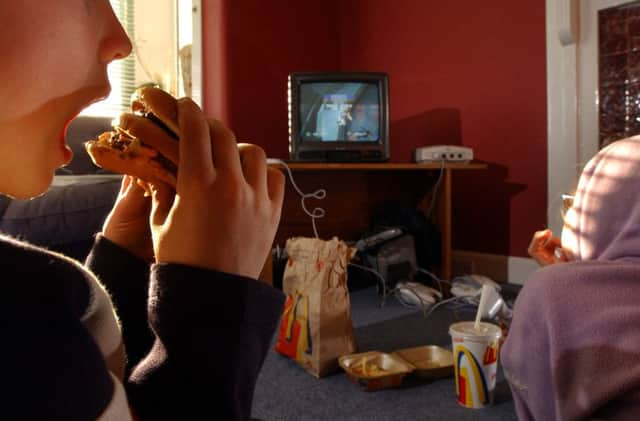Global health leaders call for junk food advert ban


The World Medical Association (WMA) raised concerns that children spend more time than ever watching television or using screens as it called for more to be done to tackle the growing problem of childhood obesity.
Recent figures show that almost 83,000 Scottish children were obese or overweight when they started primary school over the last ten years, while two out of three adults are an unhealthy weight.
Advertisement
Hide AdAdvertisement
Hide AdThe WMA, which is holding its annual assembly in Taiwan, said that social media advertising also plays a major role in the demand for unhealthy foods.
The global health body said in a statement: “Many advertisements are in conflict with nutritional recommendations of medical and scientific bodies.
“TV advertisements for food and drink products with little or no nutritional value are often scheduled for broadcast hours with a large concentration of child viewers and are intended to promote the desire to consume these products regardless of hunger.
“Advertisements increase children’s emotional response to food and exploit their trust. These methods and techniques are also used in non-traditional media, such as social networks, video games and websites aimed at children.”
Health campaigners have been calling for a curb on marketing of treats and snacks, which they claim are skewing children’s food choices towards unhealthy fare.
Stirling University experts discovered that three quarters of the marketing seen by 11 to 18-year-olds was for junk food, with healthy food and drinks’ marketing reported at only 10 percent, in a major study published last year.
The WMA also called for governments to work with the food industry to encourage them to make products healthier and to consider imposing a tax on non-nutritious foods and sugary drinks.
WMA president Dr Ketan Desai said: “We know there is a link between the extent of advertising and childhood obesity, and so we are recommending that the advertising of non-nutritious products on television be restricted during programmes that appeal to children.
Advertisement
Hide AdAdvertisement
Hide Ad“Children frequently watch programmes designed for adults, so regulators must ensure that legislation and regulation also limits marketing associated with such programs.
“We are also urging governments to consider imposing a tax on non-nutritious foods and sugary drinks and to use the additional revenue to fund research into preventing childhood obesity and reducing the resulting disease risk.”
Professor Linda Bauld, Cancer Research UK’s cancer prevention expert, based at Stirling University, said: “This is particularly relevant for Scotland which has higher rates of childhood obesity than other parts of the UK.
“We know that adverts for junk food are incredibly enticing to children; they influence the foods they choose and pester their parents to buy.
“This is why we need regulations to remove junk food advertising on TV before the 9pm watershed.”
The Scottish Government has called on Westminster to instigate the ban, as powers over broadcasting are reserved to Westminster.
Public health minister Aileen Campbell said: “We are looking at what further effective actions we can take within the powers available to us, including the use of multi-buy promotions, as well as examining a range of actions to improve diet, physical activity and education.”
A Department of Health spokesman said advertising restrictions are already some of the toughest in the world but further measures could be taken if the food industry did not take strong steps to make their food healthier.